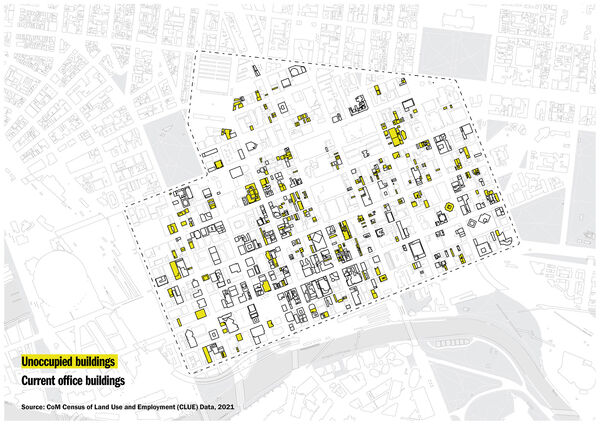The Netherlands: Analyzing The Delays In Converting Vacant Commercial Properties To Homes

Table of Contents
Bureaucratic Hurdles and Planning Permission
Navigating the complexities of converting commercial properties into residential units in the Netherlands often proves a significant hurdle. The process is slowed by a combination of complex regulations and lengthy approval processes.
Complex Regulations and Lengthy Approval Processes
- Intricate Building Regulations: Dutch building regulations for commercial-to-residential conversions are notoriously intricate. They encompass numerous aspects, from fire safety and accessibility standards to energy efficiency requirements and structural integrity assessments. Meeting these diverse requirements demands considerable expertise and often leads to delays.
- Lengthy Planning Permission Timeframes: Obtaining building permits can easily take over six months, and in some cases, significantly longer. This lengthy waiting period significantly impacts project timelines and increases overall costs. Anecdotal evidence suggests average processing times often exceed the official estimates provided by municipalities. Further research is needed to establish definitive statistics on these delays.
- Strict Environmental Regulations: Compliance with environmental regulations, particularly concerning noise pollution, waste management, and energy efficiency, adds to the complexity and delays associated with securing planning permission for commercial-to-residential conversions.
Lack of Clarity and Transparency in Regulations
The lack of clarity and consistency in the interpretation of regulations across different municipalities presents a major challenge.
- Inconsistencies in Local Council Interpretations: Inconsistencies in how local councils interpret and apply national regulations lead to project delays and increased costs for developers. What is acceptable in one municipality might be rejected in another, creating uncertainty and adding to the time required for approvals.
- Need for Streamlined Processes and Improved Communication: Improved communication between developers and local authorities is crucial. A more transparent and streamlined process, with clear guidelines and readily accessible information, would significantly improve efficiency and reduce delays.
- Digitalization of the Permitting Process: Implementing a fully digital planning permission process could significantly reduce processing times and improve transparency.
Financial Constraints and Investment Challenges
High conversion costs and limited funding opportunities present further obstacles to commercial-to-residential conversions in the Netherlands.
High Conversion Costs
Converting commercial properties into residential spaces often requires substantial investment.
- Demolition and Renovation Expenses: The demolition of existing structures, extensive renovation work, and adaptations to meet residential building standards all contribute to high upfront costs.
- Impact of Inflation and Rising Material Costs: The recent surge in inflation and the rising cost of construction materials further exacerbate the financial burden on developers, making projects less financially viable.
- Energy Efficiency Retrofitting: Retrofitting older commercial buildings to meet modern energy efficiency standards adds significantly to the overall budget, a necessary expense but one that increases the financial risk involved.
Limited Funding and Investment Opportunities
Securing funding for commercial-to-residential conversions remains a challenge in the Netherlands.
- Lack of Targeted Financial Incentives: The availability of government grants and subsidies specifically designed for commercial-to-residential conversions is limited. More attractive financial incentives could incentivize developers.
- Difficulties in Securing Loans: Securing loans from traditional banks can be difficult due to the perceived higher risk associated with these types of conversions. Innovative financing models are needed.
- Attracting Private Investment: Strategies to attract private investment in this sector are needed to reduce reliance on traditional funding sources and accelerate project development.
Resistance from Local Communities and Stakeholders
Opposition from local communities and stakeholders can also significantly delay or even prevent commercial-to-residential conversions.
Concerns about Neighborhood Character and Density
- Increased Population Density: Local residents may raise concerns about increased population density, leading to traffic congestion, parking shortages, and strain on local infrastructure.
- Changes to Neighborhood Aesthetic: Concerns about the alteration of a neighborhood's aesthetic character and potential negative impact on property values can fuel opposition to conversion projects.
- Impact on Existing Businesses: The conversion of commercial spaces can affect existing businesses in the area, leading to potential disputes and delays.
Balancing the Needs of Developers and Local Residents
Effective community engagement is crucial to address concerns and build consensus.
- Improved Communication Strategies: Transparent communication and open dialogues with residents can help mitigate opposition and facilitate project approval.
- Early Community Consultation: Involving the community in the planning stages of the project can help address concerns proactively and avoid conflicts later on.
- Community Benefit Agreements: Developing community benefit agreements that address local concerns can build support for conversion projects and help ensure their success.
Conclusion
Delays in commercial-to-residential conversion Netherlands projects stem from a complex interplay of bureaucratic hurdles, financial constraints, and community resistance. Addressing these issues requires a multi-pronged approach. Streamlining the planning permission process, providing more attractive financial incentives, and fostering collaborative community engagement are essential steps to unlock the vast potential of vacant commercial properties and alleviate the acute housing shortage facing the Netherlands. The Netherlands needs a concerted effort to accelerate these conversions. Let's work together to transform vacant commercial spaces into thriving residential communities.

Featured Posts
-
 Housing Corporations Initiate Legal Proceedings Against Rent Freeze Policy
May 28, 2025
Housing Corporations Initiate Legal Proceedings Against Rent Freeze Policy
May 28, 2025 -
 Arsenal Transfer News Top Striker Chooses Gunners Over Tottenhams 58 Million Offer
May 28, 2025
Arsenal Transfer News Top Striker Chooses Gunners Over Tottenhams 58 Million Offer
May 28, 2025 -
 Update Luis Arraezs Condition Following Collision With Mauricio Dubon
May 28, 2025
Update Luis Arraezs Condition Following Collision With Mauricio Dubon
May 28, 2025 -
 Nba 2 K25 Playoffs Updated Player Ratings Reflect Real World Performance
May 28, 2025
Nba 2 K25 Playoffs Updated Player Ratings Reflect Real World Performance
May 28, 2025 -
 Pacers Vs Hawks Injury Report Game Day Update March 8th
May 28, 2025
Pacers Vs Hawks Injury Report Game Day Update March 8th
May 28, 2025
